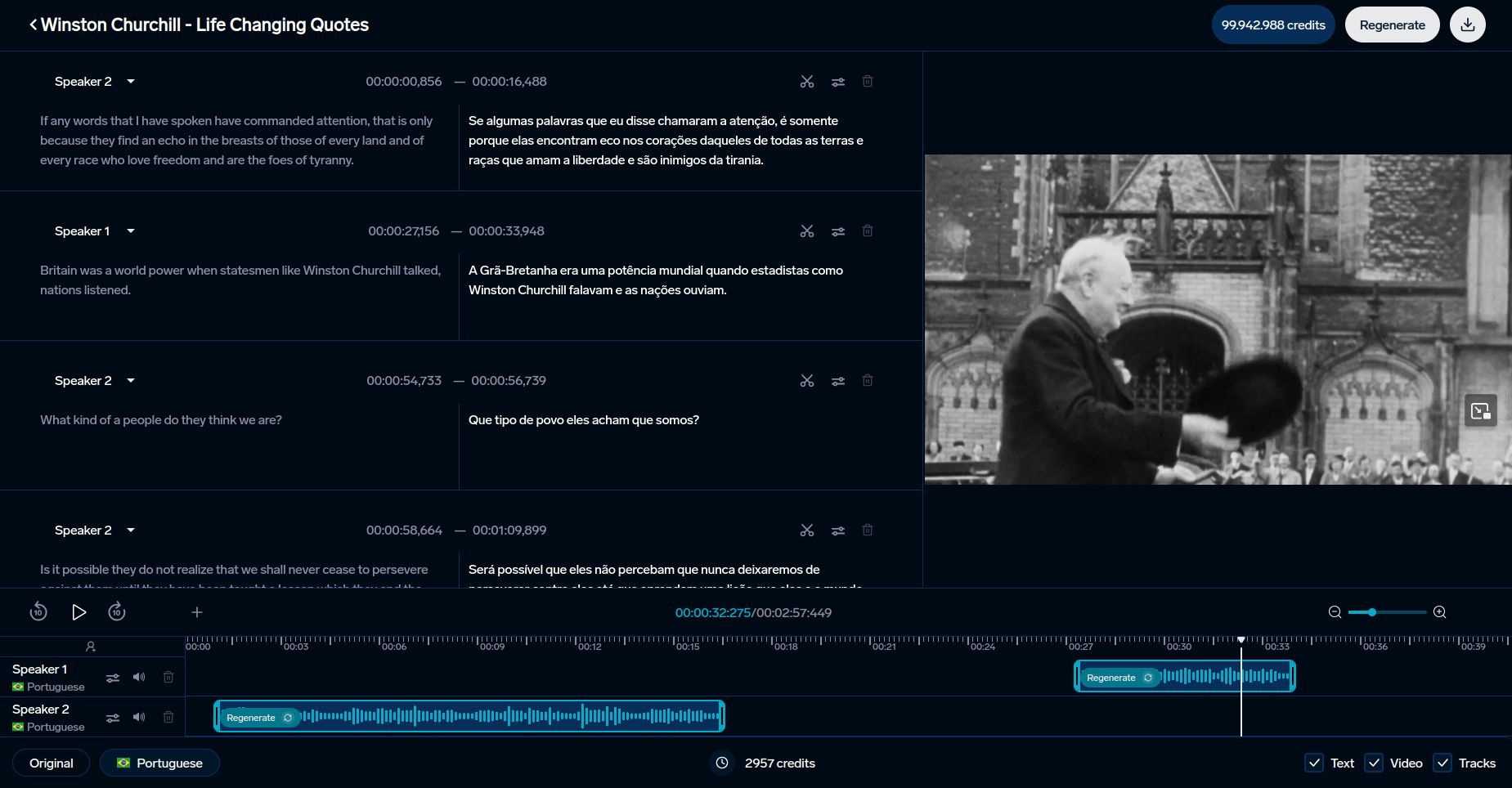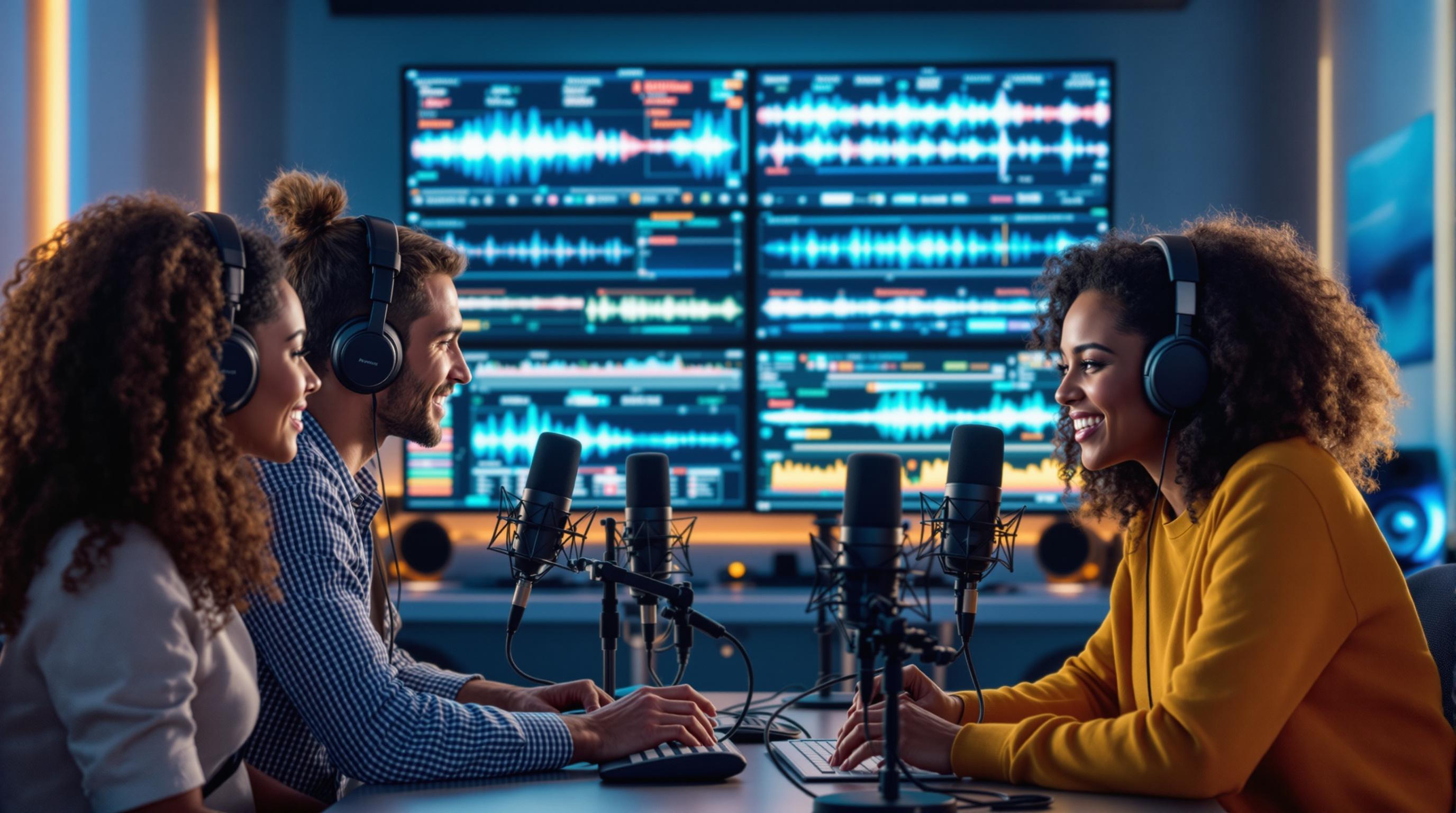AI Dubbing for Consistent Multimodal Content
AI dubbing uses advanced voice cloning, translation, and lip-syncing technology to create natural-sounding multilingual voiceovers for video, audio, and text content. This ensures a consistent voice, tone, and message across formats, helping brands reach global audiences efficiently.
Key Benefits:
- Consistency: Maintains the same voice and tone across all media types.
- Efficiency: Automates dubbing, reducing costs and production time.
- Global Reach: Supports multilingual localization with cultural adjustments.
- Accessibility: Bridges language gaps, making content inclusive for diverse audiences.
Features:
- Voice Cloning: Replicates voices with emotional depth and customizable styles.
- Language Translation: Adapts content into multiple languages while preserving meaning.
- Lip Syncing: Aligns voiceovers with on-screen visuals for a seamless experience.
AI dubbing tools like DubSmart offer support for 33 languages, advanced voice cloning, and subtitle generation, making it easier for creators to scale content worldwide. Whether for e-learning, marketing, or entertainment, AI dubbing simplifies multilingual content production while maintaining quality.
Features of AI Dubbing
Voice Cloning and Customization
AI dubbing uses advanced voice cloning to mimic voices with impressive accuracy. It can even capture emotional nuances while allowing adjustments to speaking style and pace. Tools like DubSmart make it easier to scale content by offering multilingual voice options, ensuring consistency across different markets.
| Voice Cloning Aspect | Capability |
|---|---|
| Voice Analysis | Captures pitch, tone, and emotional range |
| Customization | Adjusts speaking pace and style |
| Quality Control | Ensures consistent voice across content |
| Scalability | Supports multiple language versions |
In addition to voice replication, AI dubbing focuses on multilingual localization, helping content connect with a broader audience.
Language Translation and Localization
AI dubbing platforms are designed to translate and localize content while keeping the original message intact. They can handle multiple languages at once, cutting down the time needed for global distribution.
These systems do more than straightforward translation. They adapt cultural elements, ensuring dubbed content feels natural to local viewers. For instance, idioms and cultural references can be adjusted to better align with the target audience's expectations.
Lip Syncing Technology
AI algorithms analyze visual elements on screen to align audio with lip movements, creating a seamless experience. Machine learning models make this process efficient, ensuring speech matches visuals naturally while conveying emotional depth.
Advantages of AI Dubbing for Content Creators
Efficiency and Cost Reduction
The film dubbing industry is on the rise, with the market expected to grow from USD 3,274.73 million in 2021 to USD 5,000.1 million by 2027. This surge highlights a growing need for high-quality, budget-friendly dubbing options.
| Cost Factor | Traditional Dubbing | AI Dubbing |
|---|---|---|
| Studio Time | Requires multiple sessions | On-demand processing |
| Voice Talent | Separate actors for each language | One-time voice cloning |
| Post-Production | Manual syncing and editing | Automated processing |
| Revisions | Extra studio bookings | Instant adjustments |
AI dubbing streamlines the entire process, saving time and money while allowing creators to connect with wider audiences.
Accessibility and Audience Engagement
AI dubbing bridges language gaps, making content available to global audiences. It’s especially helpful for non-native speakers and promotes inclusivity. For instance, Netflix uses this technology to expand its reach while maintaining the integrity of its content.
By breaking down language barriers, AI dubbing creates a smoother and more inclusive viewing experience for everyone.
Scaling Content for Global Markets
AI dubbing allows creators to take their content to international markets, reaching diverse audiences at the same time. This technology makes it possible to:
- Deliver multilingual voice-overs while keeping consistent branding
- Tailor content to fit local cultural nuances
- Release content in multiple regions simultaneously
With AI dubbing, even smaller creators can compete on a global scale. Tools like DubSmart make this possible, offering translations in 33 languages. This opens up opportunities for creators of all sizes to share their work worldwide.
sbb-itb-f4517a0
Applications and Tools for AI Dubbing
Examples in Video Production and Marketing
AI dubbing is reshaping how content is created and shared across industries. In e-learning, for instance, platforms are using it to produce multilingual educational content. This technology is making it easier for companies to deliver corporate training videos, product demos, and marketing campaigns in multiple languages while keeping their brand message consistent.
Whether it's video, audio, or text, AI dubbing ensures the content maintains a unified tone and message. A great example is Netflix, which uses AI dubbing to localize its shows and movies, tailoring them for different languages and cultures to reach global audiences.
As the need for polished dubbing grows, platforms like DubSmart are stepping in with advanced tools to meet these demands.
Introduction to DubSmart AI Dubbing Platform

DubSmart provides AI-driven dubbing solutions designed for creators working on multilingual and multimodal content. With features like voice cloning and support for 33 languages, it helps deliver localized content that feels natural and consistent.
| Feature | Capability |
|---|---|
| Multilingual and Customizable Voice Support | 33 languages with 300+ AI voices |
| Subtitle Generation | Available in over 70 languages |
| Video Processing | Supports up to 4K resolution (Enterprise plan) |
These features make DubSmart a strong contender in the AI dubbing space. But how does it stack up against other platforms?
Comparison of AI Dubbing Platforms
When choosing an AI dubbing platform, it's important to consider key differences between entry-level, mid-tier, and enterprise-level solutions:
| Feature | Entry-Level Platforms | Comprehensive Solutions (e.g., DubSmart) | Enterprise Solutions |
|---|---|---|---|
| Language Support | Up to 10 languages | 30+ languages | 50+ languages |
| Voice Quality | Basic synthetic voices | Natural, expressive voices | Studio-quality output |
| Customization | Limited options | Advanced voice cloning | Fully integrated solutions |
High-end platforms leverage deep learning to enhance voice quality, ensuring dubbed content captures emotional subtleties and cultural context.
Future Trends in AI Dubbing
Improvements in Voice Synthesis
Recent progress in voice synthesis technology is making real-time multilingual voice processing more precise, capturing emotional tones and subtle cultural details. Companies like Deepdub are leading the way by replicating the voices of actors and celebrities with an impressive level of accuracy. These advancements are paving the way for more refined AI systems that combine multiple modes of communication.
Voice synthesis now achieves real-time recognition of emotional tones, improving how narratives are conveyed across different languages.
| Voice Synthesis Feature | Impact on Content Creation |
|---|---|
| Emotional Tone Recognition | Better portrayal of tone and sentiment |
| Cultural Sensitivity | Maintains the original meaning of content |
| Real-Time Processing | Speeds up multilingual content production |
Multimodal Context Awareness in AI
Building on voice synthesis advances, multimodal context awareness is taking AI dubbing to the next level. These systems are now better at understanding how visual and auditory elements interact, leading to dubbed content that sounds more natural and fits seamlessly with visuals.
The expanding demand for dubbed content highlights the industry's trust in AI's ability to transform this space.
"AI dubbing increasingly integrates human expertise to preserve authenticity while scaling multilingual production."
Emerging systems are also improving lip-syncing, ensuring a smoother match between speech and visuals. As these technologies advance, AI dubbing will become even more versatile, adapting to a wide range of content and industries.
Future developments aim to process emotional contexts more effectively, maintain consistent voice quality in long-form projects, and adapt smoothly across different formats. Beyond entertainment, sectors like e-learning and corporate communications are leveraging AI dubbing to deliver clear and consistent messages across multiple languages.
Conclusion and Key Points
Summary of AI Dubbing Benefits
AI dubbing has reshaped content creation by offering more than just translation. It ensures consistency across various forms of media while preserving emotional tone and cultural context. Modern tools also bring technical precision, such as improved lip-syncing.
| Benefit Category | Impact on Content Creation |
|---|---|
| Efficiency and Cost Savings | Speeds up the dubbing process and lowers production costs |
| Quality Control | Delivers consistent voice quality across projects |
| Global Reach | Enables simultaneous multilingual releases |
These features allow creators to produce polished, cohesive content across video, audio, and text formats.
Thoughts on the Future of AI Dubbing
AI dubbing is set to expand its role in e-learning, corporate communications, and entertainment. While much of the process can now be automated, human oversight remains critical for achieving top-tier results.
The use of deep learning algorithms to analyze voice data and advancements in understanding multimodal contexts are paving the way for even greater improvements. These developments enhance how content connects with audiences across different formats and cultural backgrounds.
Future progress will focus on refining emotional expression and cultural alignment, ensuring that multilingual content feels authentic. As the technology advances, AI dubbing will help creators deliver meaningful, multilingual content on a global scale. Those who adopt these tools will be better positioned to meet the increasing demand for culturally aware content that resonates worldwide.
